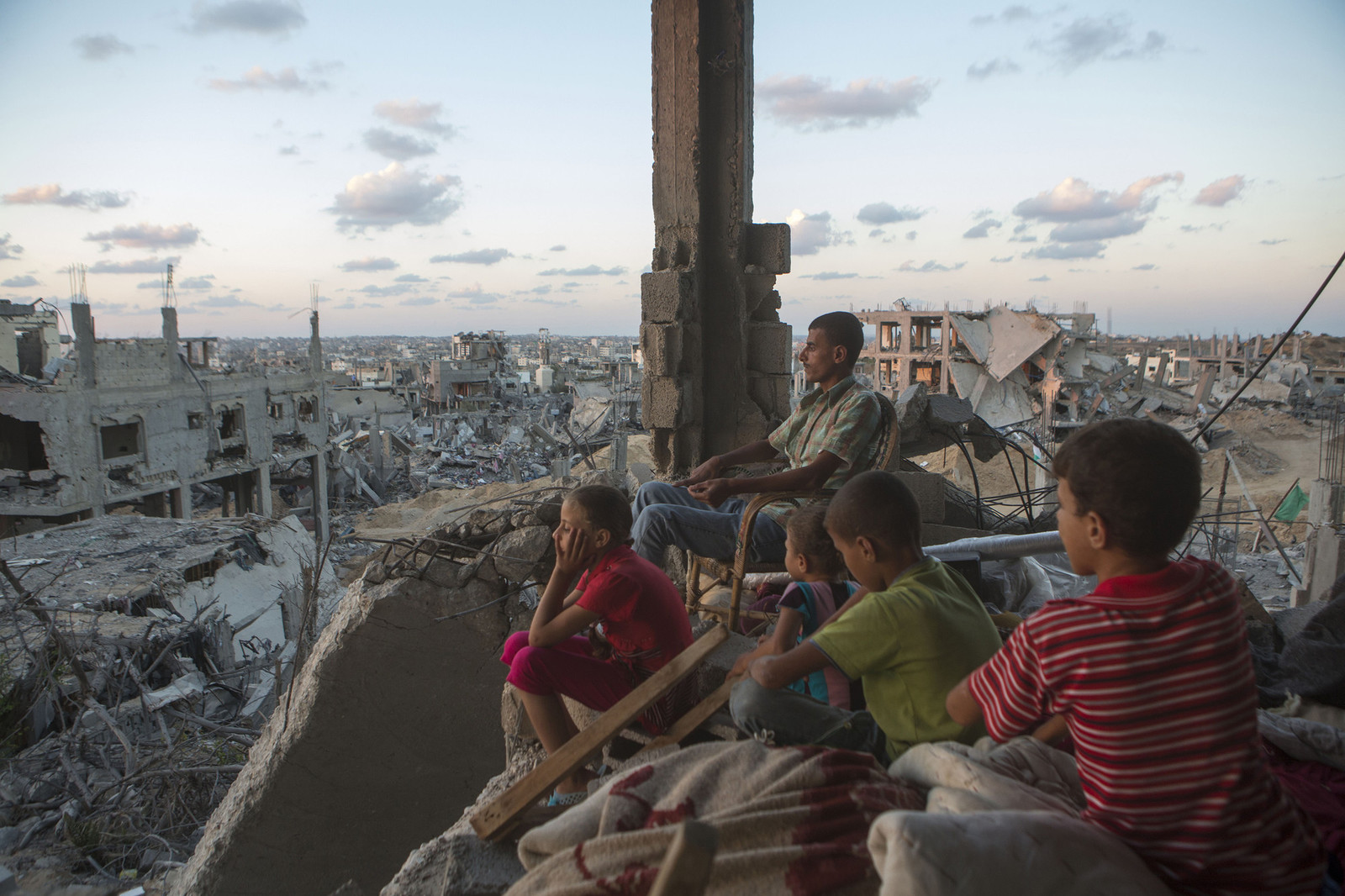
Family in destroyed home in quarter of the Al-Tuffah district of Gaza City in Sept, 2014 Anne Paq / Anne Paq/ActiveStills
Palestinian journalist and author Mohammed Omer has been documenting the realities faced by people and communities in Gaza for over a decade. In November and December AFSC hosted a tour to several US cities where Mohammed spoke about conditions in Gaza and the impact of the ten-year blockade. He also visited sites of AFSC’s work to end US based oppression on the border in San Diego, in Ferguson, MO, and at US private prisons in Arizona and was able to make connections with the occupation and oppression in Palestine. In this interview, Mohammed tells stories about Gaza and reflects on these manifestations of injustice in the US and the connections he sees.
Lucy Duncan (LD): Tell me about conditions in Gaza today and since Operation Protective Edge. What is daily life like under the blockade?
Mohammed Omer (MO): We are talking, first of all, about human beings. We are talking about 2 million people who are boxed into this strip of land, known as the Gaza Strip, an open prison, a place which is 23 miles long and about 8-12 miles wide. We're talking about an area that has been living for many years under blockade, mainly 10 years. We are talking about a place that has come through a lot of disasters, not only because of border closure, but also because of the bombardments that happen every second or third year on the Gaza Strip. Whatever has been constructed, within a year or two or three, is destroyed when a war comes. Now, the worst part of that is psychological war that Israelis are trying to do on the Gaza Strip, by people feeling that there's always an attack that's going to happen. That's something that affects the bigger life of people. The humanitarian situation is misery in Gaza.
According to the United Nations, Gaza is unlivable by 2020. But I can confirm that by 2017, Gaza is not livable. We are talking about a dire situation as far as the humanitarian condition. But there's something that is very positive, and that's the resilience of the people of Gaza, which you really cannot find anywhere. I have worked in many places, the Middle East, Europe, and in the United States, and I can tell you one thing: nobody can beat the resilience of the people of Gaza. You find that when you give them a little tree, they will make a beautiful garden out of that tree. It's something that is beyond description.
LD: That's my experience too. I was in Gaza in 2014 and have friends there still, and I think that's true. And I wonder about how resilient people in Gaza are expected to be, how much they have to live with. Can you tell me a story of one or two families that you're close to and what they're facing? What's the specific, day-to-day life like, and what do they encounter living there?
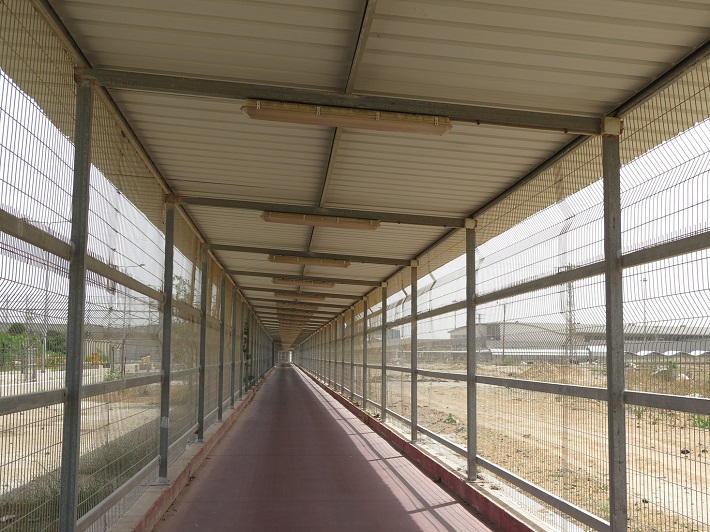
Impact of the blockade: Electricity lifelines cut off
MO: When the electricity goes out in one area in our neighborhood in the south of Rafah, we have a neighbor who happens to be living on a life-saving machine. And when the electricity goes out each time, the mother and the wife go out in the streets and scream, and everybody in the neighborhood knows what that screaming means. They want people to come and help. There would be at least 10 young men, one after another, in a queue, waiting to pump air, instead of the electricity that is supposed to do this job in order to bring life for this guy in Rafah. That's just one family.
Another family that lives constantly, every day, with the sewage water flooding into their house. The infrastructure is not functioning in the south of Gaza strip, like many places also across the Gaza Strip, because of the blockade which bans a lot of essential materials that have a dual use, according to knowledge of the Israeli military. This particular family has to try to solve the problems of sewage which is flooding in their house, and that is something very unfortunate.
These are two stories that you never hear of because they just happen in Gaza and they just confirm the misery of living in Gaza. They are average, which you won't be able to get into the New York Times or any news outlet in this country because they are invisible in Gaza, basically, for the media.
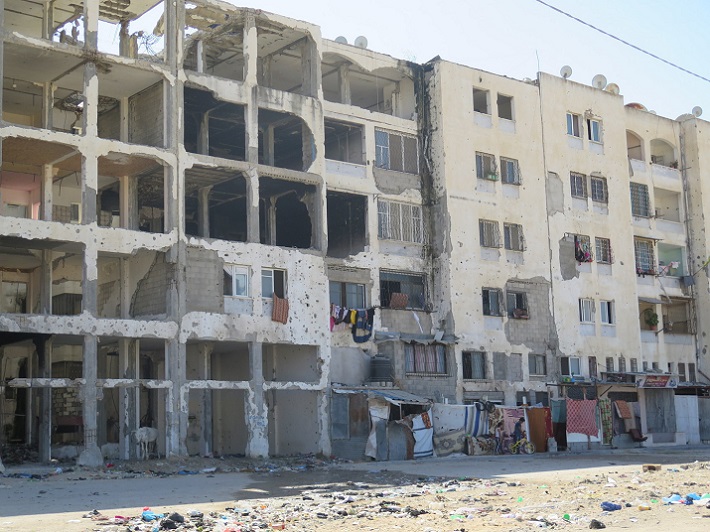
Impact of the blockade: No way to export flowers
LD: And there's a political reason for why and how invested Americans are in the Israeli myths that are put out there. When I talked to Jennifer, she said you kept telling a story of a farmer that you shared in your presentations. Would you tell me that story?
MO: Just for the sake of accuracy, the Israeli authorities in the last 2 years, have started to allow a limited number of tracts with strawberries to get outside of the Gaza Strip. Now, that's not enough, because before 2006, per season, 9,000 tracts or even more of strawberries and carnation flowers got outside of the Gaza Strip for export. Now we are talking about, in 2014, about 200 tracts. That's a huge gap. I met with this farmer of carnations who had lost business, and he went bankrupt because the Israelis closed the borders, he could not leave the Gaza Strip, and he has no permit to get his flowers outside of Gaza. That was a very unfortunate situation for him.
One day he could not get a lot of medical supplies that he needed for his family. When I met with him I tried to figure out, a man who was extremely rich, and clearly he is in a queue waiting for medical supplies like anybody else. I started to wonder, so I went to his farm, and I found he had to sell business in order to pay the debts and pay the workers, and himself, he's going to be arrested by the Gaza authorities because he did not fulfill his promises by paying all the expenses for the people who worked for him over the years. And why is that? Because he could not ship his carnation flowers outside of Gaza. Instead, he had to give it to the animals to be fed, for the cows and the camels in Gaza, instead of having decent flowers in the hands of lovers in the Netherlands and elsewhere in Europe and the United States.
That's something that hits on a personal level, and you can count a lot of the stories that are similar to that, which explain how the Palestinian economy collapsed because of the blockade.
LD: Farmers take risks even farming around the separation wall where they can get shot if they are there after certain hours, so there's all the layers of the oppression, too. Will you reflect on your US tour? I want to know what surprised you the most as you came to the United States, and as you learned from US citizens about their perspective on Palestine and Gaza.
Working against ignorance, spreading the truth
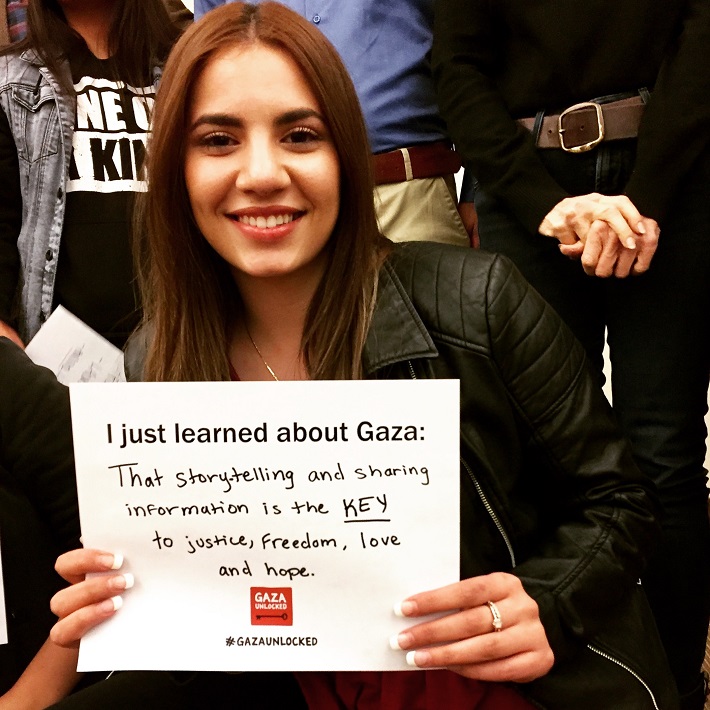
MO: What continues to surprise me, coming to this country, that there is huge difference between the US made missiles and the US raised citizens. The first, cause so much damage and agony, but the second come and listen and get so interested and want to be part of the humanity that we share. This is something which people in the Middle East don't know, and it's my job as a journalist to tell them.
Americans are not the missiles that you guys meet that come from the F-16. They are good people and overall, and they are ready to engage and listen. I have been very well-received in all the stops during my speaking tour, the first part and the second part, across the United States of America. One thing which I can confirm, there is a change, thanks to the Internet, on the issue of Palestine. Before 2006 I used to be heckled when I spoke on Palestine. Now, it's almost 2017 and I have not been heckled. People are ready to engage in serious and respectful dialogue, and that's a very good start. Now, that's something which I find very important, to convey that message not only to Americans but to the people in the Middle East.
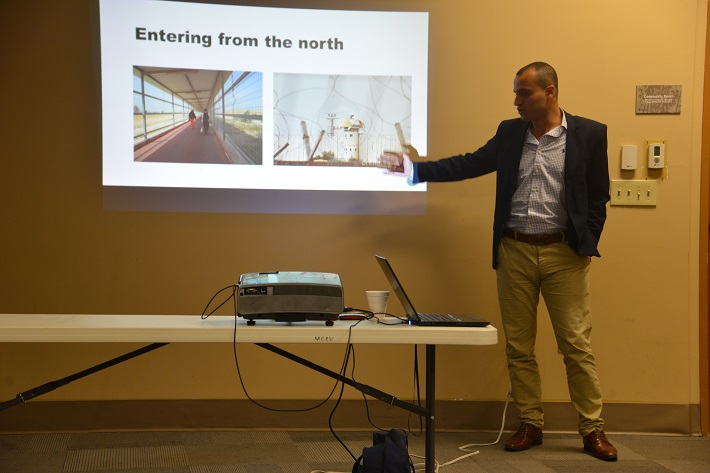
What surprises me is the level of ignorance also among the people. As much as they are delightful, there is so much ignorance, which you can pick at random, anywhere. I can go, you and I can go and walk down in Philly, and poll 20 or 30 or 40 and ask them, can you say 2 facts on Gaza, people won't even know what Gaza is. They would tell you (I have done that by the way), they say, "What do you mean?"
That is something where we need to do a lot more work. That's where the importance of a group like the Quakers comes, to engage Americans more, to share the humanity and the troubled world we are living in. An isolated American is not a good idea. Trouble we thought is far away from us, when the Syrian refugees started to hit, all the Middle East, suddenly they hit Europe and Canada, and soon the United States, so we start to feel the crisis with the refugees because you know, there are problems out there and we cannot turn our back on these problems, we have to engage them in a very responsible manner.
LD: There's this sort of distance between the level of ignorance, and then you learn the truth. That's the importance of your tour, of writing and speaking about this. One thing that's clear to me is that this ignorance is constructed, and you realize how deep the political crisis is about it as well. And then, once you know, you want to do something about it.
Steadfastness in the face of horror
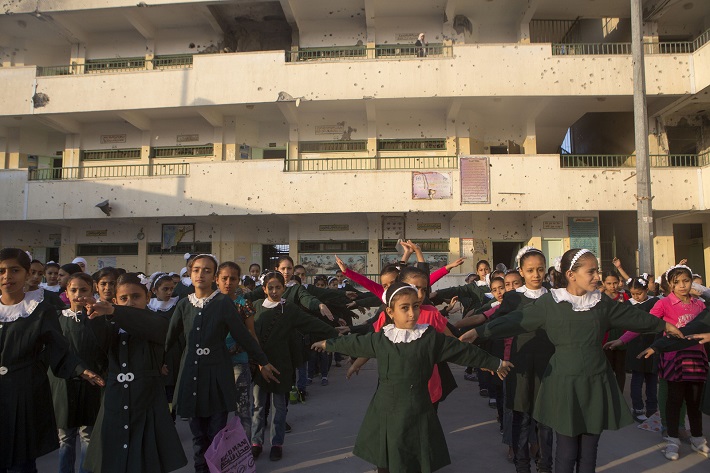
What stories resonated with the US audience that you met and with activists here?
MO: There are plenty of stories that people connect to. One story that resonated was about a young teacher, who lives in the east of Gaza city, and who during the war, lost his two legs and his arm in a bombardment on his house. One day, just when the schools were getting ready, and all of the children were trying to collect what remains of their educational materials, from school bags to pencils, from underneath their demolished homes to go to school, I came across this teacher who is trying to iron his shirt. It had been just two weeks or three weeks ago that he lost his two legs and arm and he is actually going to school.
I joined him to go to school with him, to see what he is up to. And in the middle of his students, he stood and everybody was puzzled what is he up to, the teacher who lost three of his limbs. He was looking at me and he said, "We teach life. Life has to continue. We have to teach these kids life, we have to teach them the educational values they need to know to be more responsible and committed citizens, and that's why I'm here, back in my school." And you look at these schools, riddled with bullets, the doors, and a lot of shooting and missiles. That's a story that hit a lot of people.
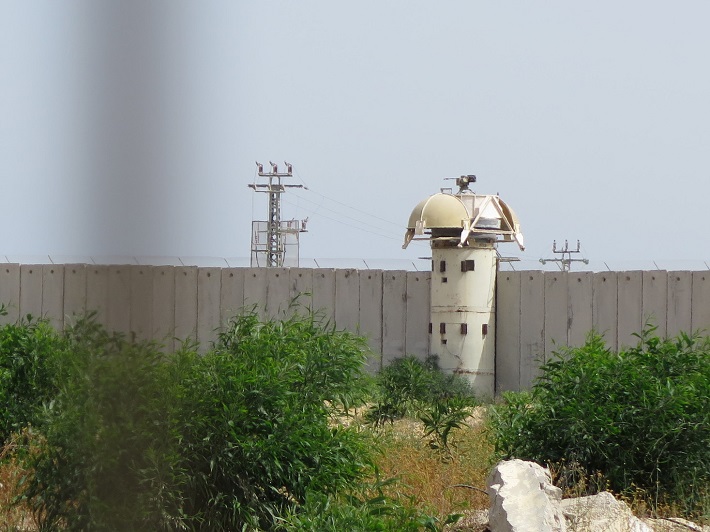
Continuous Stress Disorder
LD: Wow, that’s an incredible story. Just the fact of the literacy rate, given the circumstances there is incredible, and a testament to the steadfastness of the people. You also told stories about how post-traumatic stress disorder shows up in Gaza. I can't imagine anyone in Gaza who doesn't exist facing that all the time. How do people face that, and what's the impact societally and in people's daily lives?
MO: Two million inhabitants, out of them, there are 1.2 million of the Gaza population, they have continuous traumatic stress disorder. I've talked to a Gaza psychiatrist who's one of the leading Gaza psychiatrists who said, "If we are talking about post-traumatic stress disorder, I can confirm to you that the 2 million inhabitants including myself have post-traumatic stress disorder in this country.” Now, that is not surprising. When children go through trauma of war, when they go through frequent electricity blackouts of 12 or 18 hours per day, when they are locked between four walls and surrounded by drones and F16s and warships and bulldozers and tanks, and the feeling of being always locked in, is something that triggers continuous or post-traumatic stress disorder. It's something which haunts people.
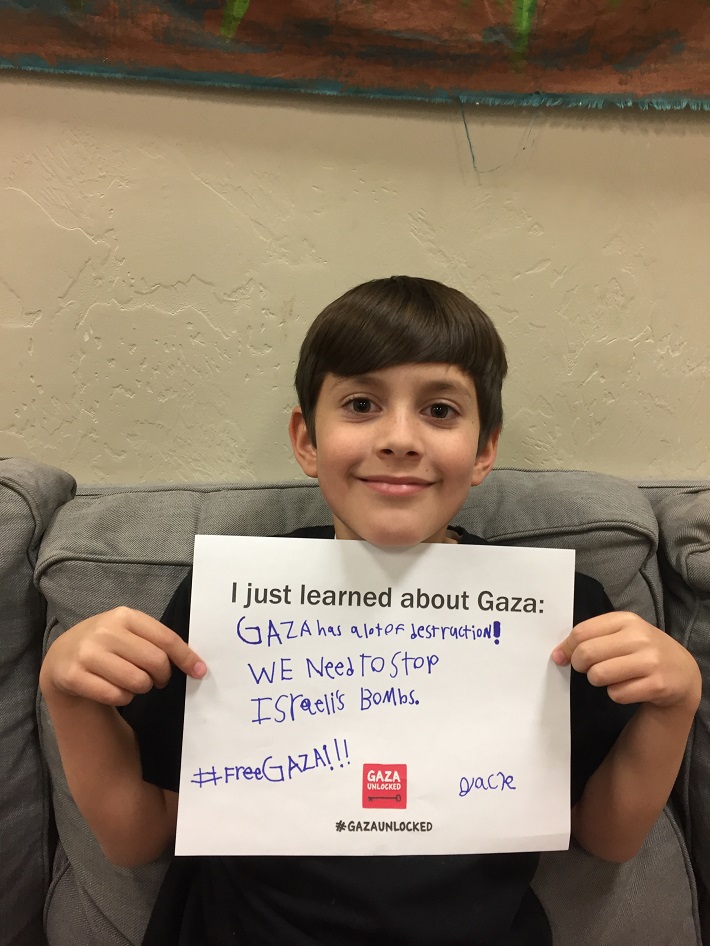
Think about something as simple as that, you are having a dinner and then suddenly one of the kids fell from the third floor. He survives, he is maybe 7 or 8 years old, but then there is an internal bleeding in the brain where he needs to be taken out to a hospital, and then the Gaza hospitals are ill-equipped. So what are you going to do when you are locked in and it's a weekend? You are subjected to the moods of the Israeli soldiers, because it's the weekend and Gaza is locked and you can't leave. Just imagine that particular scenario, of not being able to take your own child for medical treatment in a timely manner, where every minute matters in the life of your child. Just think about it and you will understand how it is to live with the continuous traumatic stress disorder.
LD: I can just imagine being a mother in that situation and not being able to, in any real way, be able to protect your child. My friend Ayah Bashir talks about how her mother says, "We're raising our children to be fodder for Israeli bombs, how is your conscience?", she says to the international community. She said, "We're fine, but look what you're doing to us."
In response to the presentations, people were writing signs about what they learned from your presentations. What was your experience of the signs, and how did people in Gaza react to them?
Social media as a lifeline
MO: It was a lot of like reactions from Gaza. Gazans think that Gaza is forgotten. There is not much international media about what is happening or there is not much media attention on what is happening. People get all the time cheered and excited that somebody is holding the name of Gaza on a sign and they learned something about Gaza.
The Gaza narrative is now being discussed after a long time of being dismissed, because of what is happening in Syria, Yemen, Libya, and all the different challenges in the regions. So it's brought a lot of joy to the Gazans. The #GazaUnlocked hashtag, many people in Gaza keep following it because they want to hear what's going on with the Gaza Unlocked campaign and to see what the latest is. Someone told me the other day, this has become his way to breathe and his way to connect to the people and say “Oh, they are listening.”
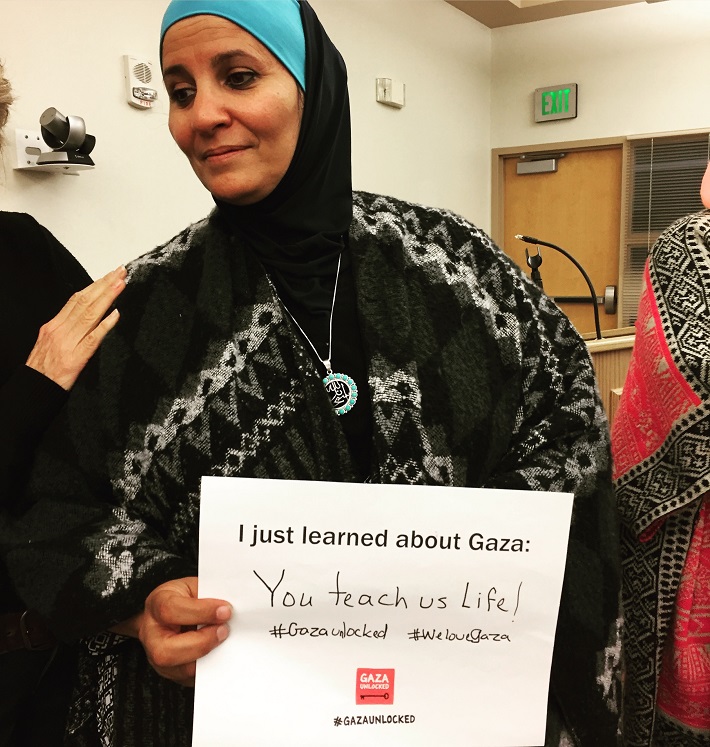
LD: I realized that in addition to just the practical aspects of not having electricity, the ability to connect with the world through social media…it was clear from all of my friends that during Operation Protective Edge, that social media particularly was a lifeline that was cutoff.
So when I visited Gaza and Palestine, I felt like I was witnessing a super-charged settler-colonial project that was unmasked, in hanging around with AFSC staff and visiting the people that we visited. And when I came back to the US, I felt as though I saw the US with different eyes, that this is obviously a settler-colonial project too, that's further along or it's been around for a while, and it's a bit more hidden in some ways, and certainly the depth and the level of the oppression is different, particularly depending on who you are in the United States. It's more hidden here, at least to me as a white woman. You visited the militarized border in San Diego, and I wonder about the impact of that visit and your perspective on the kind of oppression that's here and the oppression of immigrants along the border and the people that you met, and what similarities and differences between that wall and the separation wall in Palestine, and the stories that it evoked to you. I know that's a lot of questions, but whatever you feel like you want to respond to.
Touching through walls
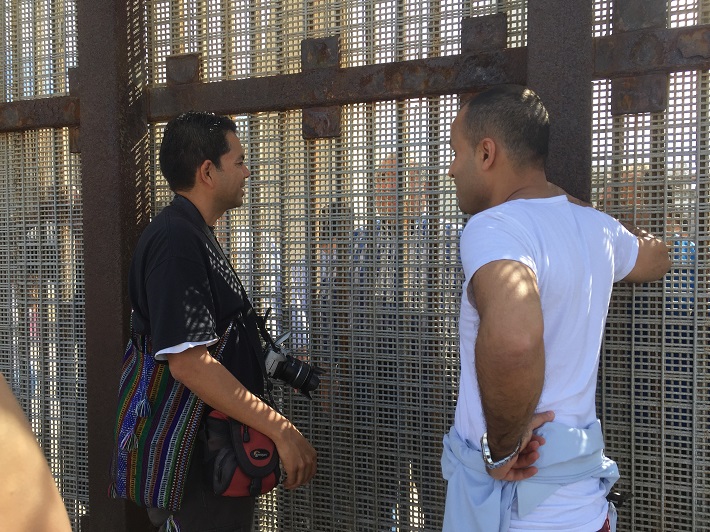
MO: What I connected with most, is when families have this opportunity to meet, and between two fences touch through the wall. And that only happens on weekends at a specific place, at Friendship Park, which I visited with AFSC. I know other places it wasn't possible to visit. As I recall, we had to walk at least 1.5 miles to get to the park. The border police did not allow people to drive up. I have seen a lot of people, including the Mexican women, beautifully dressed, she was going to meet with her sister who was on the other side of the wall, and she was carrying her shoes in her hand, because you have these bumpy roads and she's coming with nice shoes to see her sister, with her relatives and her other sister. It resembled a lot of things Palestinians have to face with walls. As much as this is a very small, but important detail to convey to the people in the Middle East. I have posted this image of people trying to hug through finger touch, basically. Through this wall, you can barely put a finger through, just touch a finger to the tip of the other finger, and then somebody said, "Oh their wall is more humane than ours." But that's not the case, I think. In many ways, the other wall in Israel and Palestine is much worse than the one between Egypt and Gaza, but there is a lot of injustice in this country as well, which produce the outcome of massive displacement of families, lovers, and friends which I have seen throughout my visit to San Diego in particular.
LD: Were there particular stories about Gaza that it reminded you of, or just the general emotion?
MO: Actually, the moment I got there reminded me of my childhood when I used to go to school along the border line with Egypt and the wall. I used to be the little kid, 7 or 8, and usually I would be asked by some of those old women who are having their back against the wall and waiting for some young, energetic boy to shout for them to their relatives on the other side. And that's what I used to do, I would shout for these women or on their behalf. They would say, "How is Zumiyah?" And I would be screaming, "How is Zumiyah?" and then would bring the message. She could not shout, and she often couldn't hear properly, so I would have to do both things for her. And then go through a lot of detail, asking about Zumiyah and when she got pregnant, and when she gave birth, and how is the weight of the baby, and about her sister and what she's up to, and is she seeing somebody, and did he come and propose officially or not officially, and what's the action of her mom, and did she like the guy or not like him, did she find him interesting enough, what is he doing, what type of job is he performing, will he be able to get their paperwork to pass the border to travel with him or not...all these human details that I used to say and experience as a child, shouting at the border. I experienced exactly the same...it just awakened a lot of memories, being at Friendship Park in San Diego.
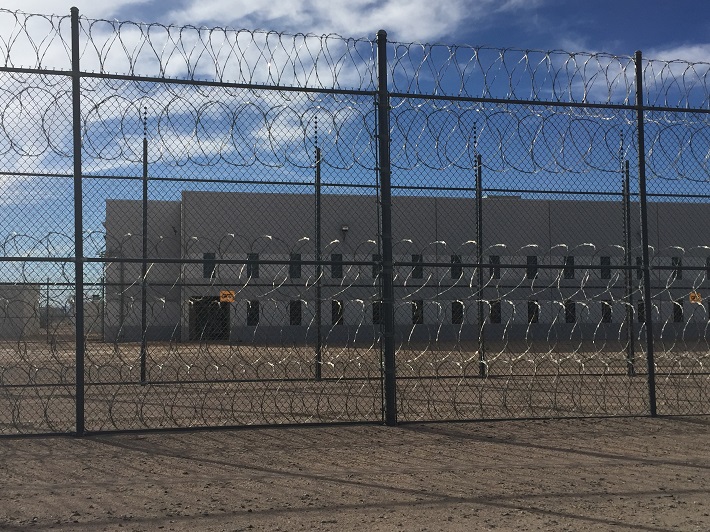
LD: Jennifer said that you drove past or visited prisons in Arizona too, and that that also reminded you of your own experiences in Palestine.
MO: I have seen a lot of prisons. These prisons are identical copies of Israeli prisons, from A to Z. Identical in location, identical in construction, identical in the way they are built, with the cameras, identical in the [role of the guards] and how they look. Identical! Everything is the same, even the atmosphere, the fear, the smell. Everything is just identical.
I have seen other prisons in other places, like Egypt, which are bad, but it's much worse when you see a very big state like the United States, a democratic state, having all these prisons for people of color, which is something I find very upsetting. That has definitely awakened a lot of memories in me, as a Palestinian, who lives in and grew up in one of the world's biggest prisons, Gaza, and to see all these prisons exist. Why? You start to wonder. It was quite appalling to hear the details of resistance in these prisons and why they existed. [Families have a hard time reaching their loved ones in prison, it’s made so inconvenient.]
A lot of these details are very despairing, but identical to what is happening in Israel. People are going to lengths of 12 or 13 hour rides, to go after security checks from Gaza to go to Nigazh. Arizona is identical to [an Israeli prison] in Nigazh. Identical. Same. It makes me wonder who is training who in this situation.
From Ferguson to Gaza
LD: And you also visited Ferguson, I've been there. At the Chicago interview, you talked about seeing Mike Brown's plaque. Talk about that--who did you meet, what stories did you hear, and how did you connect with that?
MO: I went to the local AFSC coordinator, which was a very good opportunity for me to connect with people in that part of the US. What was obviously very moving for me was hearing from local Black American activists who told stories of Mike Brown. And with the plaque, and we saw where he was shot.
Now, one thing which I can confirm for sure, is that Mike Brown's case is one of hundreds of cases of Palestinians who are left to bleed for hours. The same is true, and it's done by excessive use of arms and power and in the military police. Accountability is something that is exactly the same during the wars and not war. They're thinking about fishermen that are left to bleed in their ships for hours before they get help, and often die. There are shepherds that go with their animals that have been shot at, and they often die. We are talking about people who wanted to seek jobs. We are talking about mentally ill people who happen to just be frustrated with Gaza and approach the borderline and they would be shot at by the police and eventually die. I can name at least 4 or 5 of those people who have mental illness and they just go to an open space, and the borderline is an open space and the moment they start to wander and walk there, then they are shot and left bleeding. So, Mike Brown is not alone, Mike Brown also is lifted in Gaza, and I'm sure the mother of Mike Brown would connect easily with the same feelings of the mothers in Gaza who had the same fate.
LD: One of the things when I was standing next to Mike Brown's plaque, there's apartment buildings there, and then there's that lawn, that really pretty lawn that's right there. And it made me think about the normalization of evil, and the banality of evil, and how this is a place, it's just a place, and these evil things are happening regularly, and I think that that's sort of what I took away from it.
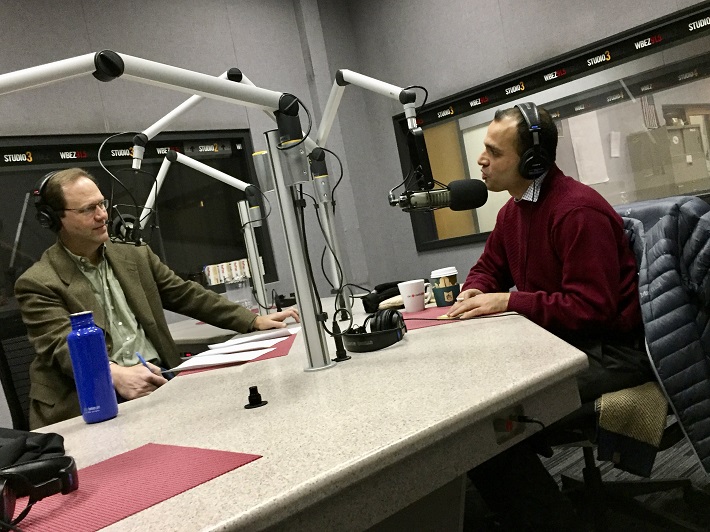
MO: The fact that Ferguson exists there in Missouri, and it exists there, is actually in itself a normalization of the devil and evil acts, basically. The fact that this is happening in this country is a normalization of evil. When you look at this, and there are all these nice trees, it's happening here, really? Give me a break.
When I heard Ferguson I was expecting a refugee camp but no! It is beautiful. This is part of the United States of America, and this exists. And we are in 2016, for God's sake! It's the normalization of evil acts like these, and I hope that this is not going to be repeated. The blood of Mike Brown made history. It made a big move around the world, and I think it's only good that it did that, it's only advocating that life, Black life matters.
I met with a group of activists down there, the group is called Youth Undoing Institutional Racism. I was very impressed the resilience of this group of youth, working around the clock trying to look for institutional racism and try to undo it, in many ways, including dialogue with all these companies and organizations. So, there are good people doing something good, because they love America, but they would love to have an equal right, and to live white and black together, people of color with Muslims, Arabs, Hispanics, without any problems. Because this is after all the core values of America.
LD: The supposed core values, yes. It must be strange to have been here during this election cycle. Obviously, there's a targeting and a continuous violence against Black and Brown people, and Muslims in America, some people in particular are under threat given the US election, not that it wasn't bad before, but now Muslims in America are under even greater threat given the election. What did you observe traveling in the US the month after the election? And I hear you visited some mosques, and I'd love to hear your reflections about those visits.
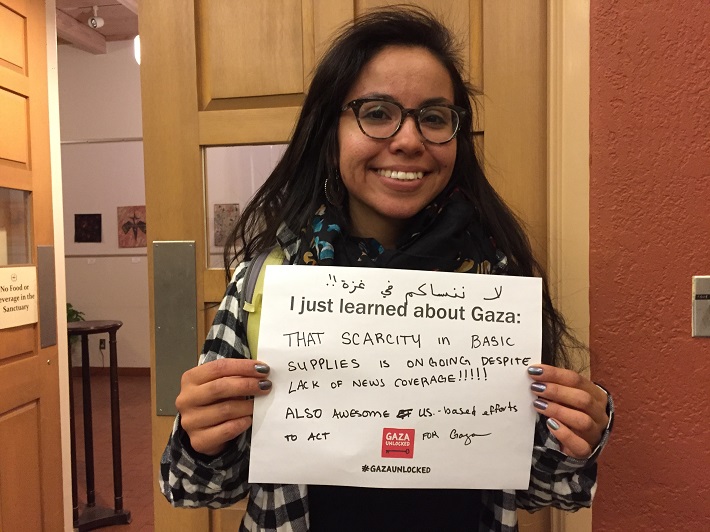
MO: Well, first of all, Muslim-Americans are very important fabric of the American society. They show pride for America more than anything else, more than any nation. Because America, that's what they know, they're born here, they knew America and they want to continue living here. It's their country, basically, but they happen to be Muslims. And that is the idea which needs to be more and more known in the international scene, that American Muslims are like everybody else in America. They are the good people who have committed to their work. I have a met with a lot of successful American Muslims, from Arab roots, who are doing all kinds of pioneering jobs and there are big businesses they are running for the country. They are good for the diversity of the country, and they are those people who connect the economy of America to the outside world.
They are there, and they send their kids to schools and they are more American than Arab, I would say. I was very pleased to meet with them and visit the mosques and speak to the community there. As much as we are talking about ignorance among a lot of Americans, there is so much ignorance among Muslims as well, in the mosques and the communities, because for a long time, mosques have been avoiding talking about anything else but worshipping God. There is a need to engage mosques more and more in constructive dialogues around all types of issues, because that's the change we would want to see. The change we would want to see is more diversified, which would bring a new spectrum of thinking on the table. That should not only include Christians in the churches and Jews in synagogues, but also Muslims in their own mosques.
I have talked quite a lot of places in synagogues and churches, but it was the first time for me to speak in Indianapolis and St. Louis in mosques. It was a rewarding experience. They said, “Now we finished inside the mosque, that's the official talk, now we want to go for unofficial coffee for journalism in the Middle East, how is life, discussion about Arab Spring, Syria, Lebanon, talking about Turkey, talking about Russia...and those people, they carried the spirit of good, American Muslims.”
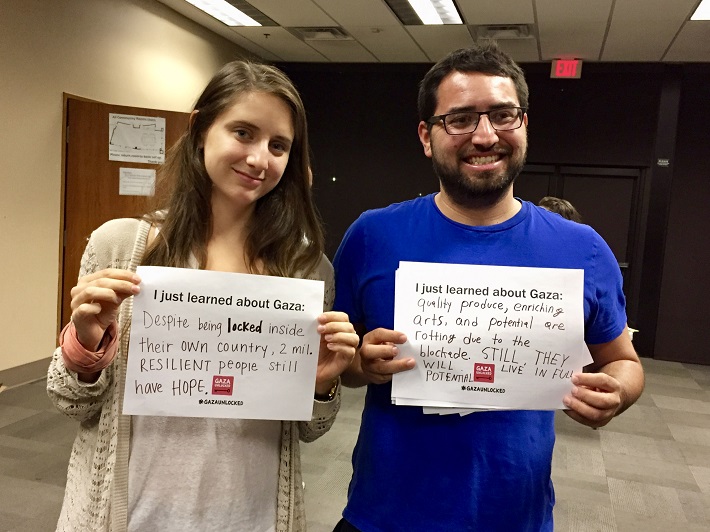
A place to grow?
LD: But did they express fear? I wonder about their perspectives on political activism and the election, too.
MO: No doubt, fear is there. I have seen more fear on campuses, at schools, major schools, a lot of schools that have to bring psychiatrists to talk to the kids, especially foreign students who are afraid, what's going to be happening with their studies, they don't know what's going to be going on, they can't sleep at night. I think it's time for the new President-elect to assure those people that none of that is going to be happening. They are going to be able to continue. He needs to assure that America will not change, America will remain home for all people and to stand by the American values that we were born knowing, really. That's important now.
If we keep these generations in a state of constant stress and fear, it does not help anybody, it does not help Americans, and it's no good for the branding of Americanism in the outside world. What do you want people to say about Americans? America is supposed to be the place where you can have the freedom to vote, you can carry your research, you can do your academic work, you can prosper and grow, and you can support the economy. What kind of America do we want after the next 4 years? This is a big question that the new President will have to address. We have to make sure that we make people comfortable in their own zones, and ensure that they are getting proper support, not always the feeling of being a burden on the state, because they are not a burden, they are ... those people are coming from a road, and they bring a lot of luggage with them, and that's knowledge. And as far as I'm concerned, America is all about opportunities, knowledge, and resources. And this should continue to be impressed in the coming 4 years and after that.
What is most encouraging?
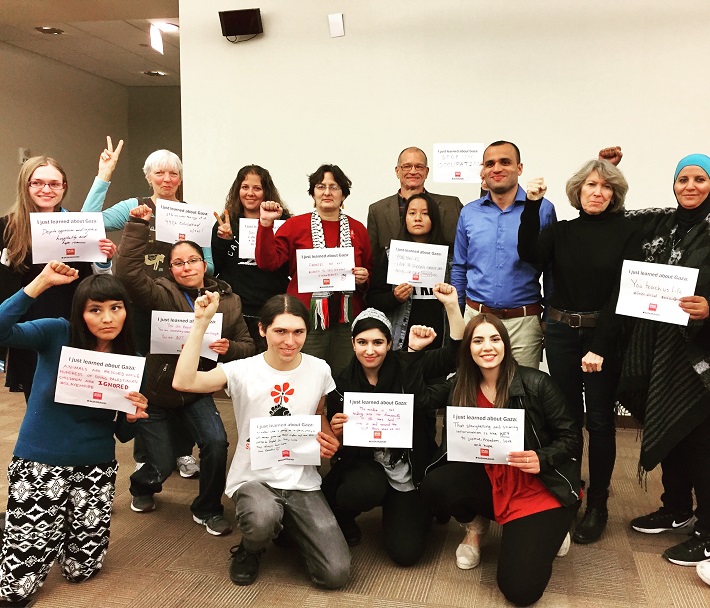
LD: What encourages you, especially after this tour, what kind of encouragement and hope are you leaving with? What's the thing that you think of, as you're going back to Gaza, what would you say that would be the most encouraging thing that you experienced or that you take away from this trip?
MO: People go to their beds with social media and cell phones in their hands, and that's a very good start. That's a good start to introduce into Palestine, to introduce into Syria, to Lebanon, to Yemen, and many issues around the world. And this was not the case before, we were having media that controlled how Americans should think. But nowadays, Americans can think for themselves, Americans can join social media, Facebook, Twitter, Instagram, and all the media outlets that get on YouTube and educate yourself, and act on that, and become active, and get involved with all the issues that matter. That is something which I find very helpful. And I find there are people who are interested in listening and engaging. They have just been victims of a media blackout for decades. But now this is slowly changing, and I'm confident in the long run it's going to be good to watch Americans engaging more with issues that matter to them.
Related Content
My grandfather and I: Descendants of refugees in Gaza learn the story of their elders